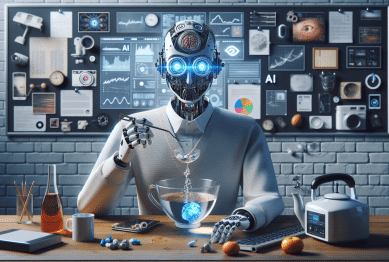Explore the fascinating world of quantum computing and discover how this evolving technology is poised to reshape fields from cybersecurity to scientific discovery. This guide breaks down key concepts, real-world applications, and the impact quantum breakthroughs may have on data, AI, and beyond.
The Basics of Quantum Computing Explained
Quantum computing is capturing attention for its potential to revolutionize how information is processed. Unlike classical computers, which use bits as either 0 or 1, quantum computers utilize quantum bits (qubits) that can represent both at the same time. This superposition property enables quantum algorithms to perform complex calculations and solve certain problems faster than even the best traditional supercomputers. Researchers often describe this as a parallelism advantage, as multiple possible solutions can be explored simultaneously, rather than sequentially. This makes quantum processing a hot topic across scientific and industrial communities.
Another exciting concept in quantum computing is entanglement, a phenomenon where the state of one qubit can depend on the state of another even at a distance. This physical property provides a powerful tool for both computation and communication. Entanglement forms the foundation for areas like quantum cryptography and ultra-secure communication protocols. Tech enthusiasts increasingly investigate how harnessing this unique ability might lead to secure networks and new possibilities in distributed computing.
The math behind quantum mechanics can seem daunting. However, the practical takeaway is that quantum hardware can handle computations that stump classic digital hardware. Still, building stable and scalable quantum computers comes with significant engineering challenges. Issues such as qubit decoherence — where information is lost — and the need for extremely low temperatures to operate, mean today’s quantum processors remain experimental. Yet companies and academic labs consistently report steady progress, making quantum technology’s mainstream potential a subject of ongoing debate and research (see https://www.nist.gov/quantum-information-science).
How Quantum Computing Differs from Classical Computing
Traditional computers, at their core, execute instructions through a series of logic gates that manipulate bits of data. Quantum computers, on the other hand, leverage quantum gates to operate on qubits. The result is exponentially increased computational power for certain tasks. For example, a quantum computer could, in theory, solve mathematical problems like prime factoring much faster than classical devices. This could disrupt established protocols in cybersecurity which rely on the difficulty of such computations. Security researchers closely monitor developments in quantum-safe encryption because of these emerging capabilities (https://csrc.nist.gov/projects/post-quantum-cryptography).
The way quantum computers represent and manipulate data leads to probabilistic, rather than deterministic, outputs. Instead of a single answer, quantum algorithms return a range of possible outcomes, each with an associated probability. This means interpreting quantum results involves statistical analysis. Such an approach opens up new ways to model uncertainty, making quantum computation particularly suited to tasks like machine learning, financial modeling, or complex simulations. The synergy with artificial intelligence, for example, holds promise for more efficient neural network training.
Another stark difference is scale. Classical hardware is measured by processor speed and memory, but quantum computers are judged by the number and quality of qubits. Current quantum processors typically have dozens of qubits, while next-generation prototypes aim for hundreds or even thousands. Scaling up is not just about numbers, but also about reducing error, stabilizing operations, and maintaining quantum coherence. These engineering feats are crucial for practical, large-scale applications, keeping the race towards quantum supremacy alive in both public and private sectors.
Key Applications of Quantum Computing in Science and Industry
Fields such as chemistry and materials science are already seeing the early benefits of quantum computing. Quantum algorithms can simulate molecular structures and reactions far more efficiently than classical methods. This is because the behaviors of molecules and atoms themselves are governed by quantum physics. Optimizing battery technology, developing new medicines, and streamlining chemical processes become more attainable with the power quantum simulations offer (https://www.nature.com/articles/s41586-019-1666-5).
Logistics and supply chain management represent another promising quantum application. Problems like route optimization and resource allocation — both extremely calculation-intensive — could be solved much faster, improving the efficiency of industry processes. Companies invested in this research hope to unlock cost savings and unlock smarter automation. Even financial institutions are exploring how quantum computing might enhance portfolio optimization, risk analysis, and fraud detection.
One of the most headline-making uses is in cryptography. Quantum computers can theoretically break some current encryption algorithms, prompting the push for quantum-resistant alternatives. Simultaneously, quantum key distribution offers ultra-secure ways to protect sensitive data. The real-world rollout of such systems, however, depends on overcoming practical challenges, but the groundwork is being laid in both academia and industry research labs.
The Challenges Facing Quantum Technology
Not everything in the quantum universe is smooth sailing. Quantum hardware requires precise conditions, often near absolute zero temperatures, maintained by advanced refrigeration systems. Even the smallest temperature fluctuation can disrupt delicate quantum states, leading to errors or loss of information. This makes building, maintaining, and scaling quantum computers a significant technical hurdle.
A further challenge comes from error correction. Because quantum information is fragile and easily disturbed by its environment, quantum error correction schemes are a major research focus. These systems introduce redundancy at the quantum level, which can protect valuable computation from being lost or corrupted. However, implementing them adds further layers of complexity, often requiring even more qubits and circuitry. The goal is to make fault-tolerant quantum processors that rival classical error rates.
Beyond hardware, the software ecosystem for quantum computing is also maturing. Programming quantum devices isn’t just a matter of translating code from classical languages; it demands a new way of thinking about algorithms. This means developing novel quantum software and tools, as well as specialized education for the next generation of quantum engineers. Industry and governments are investing in educational initiatives and partnerships to close that talent gap (https://www.ibm.com/quantum-computing/learn/what-is-quantum-computing/).
Where Quantum Computing Stands in the Real World
Quantum computing is no longer the stuff of only theory and speculation. Several technology giants, startups, and universities already operate prototype quantum hardware accessible via cloud platforms. Users from a range of backgrounds can experiment with quantum code, run small computations, and even participate in educational programs. This democratization of access furthers research and builds enthusiasm around emerging quantum applications.
Despite early progress, practical quantum advantage — the point where these devices outpace classic computers on real-world tasks — remains a milestone yet to be broadly achieved. Most current successes involve highly specialized problems. It is anticipated that extended investment, improved quantum devices, and enhanced coding skills will bring more general-purpose solutions over the coming decade.
Collaboration is also key. Global partnerships between governments, industry, and academia are fostering a vibrant research environment. The result is a steady flow of new ideas, better hardware prototypes, and richer open-source software libraries. The journey toward mainstream quantum computing continues to spark curiosity and innovation worldwide (https://www.nature.com/articles/d41586-021-02107-9).
What the Quantum Future Could Mean for You
Quantum computing’s biggest impact may be on the technologies relied on every day — from encrypted messaging to cloud storage and big data analytics. As quantum devices mature, they will likely reshape standards for security, privacy, and computational capability. It’s essential for organizations to keep updated on post-quantum cryptography developments to future-proof data protection strategies (https://www.enisa.europa.eu/news/enisa-news/post-quantum-cryptography).
For professionals and students, quantum literacy is becoming an increasingly sought-after skill. Universities and online platforms now offer courses in quantum programming and foundational theory. This educational push aims to prepare a new generation of workers who can design, manage, and leverage quantum systems responsibly. It might be worthwhile to explore what’s available and consider gaining at least a foundational understanding.
Looking ahead, quantum computing could impact nearly every sector, from healthcare and pharmaceutical research to AI and national security. Keeping an eye on quantum progress could offer competitive advantages, whether in industry innovation, research direction, or policy development. The quantum revolution is not just about faster computers — it’s about opening the door to problems yet unsolved.
References
1. National Institute of Standards and Technology. (n.d.). Quantum Information Science. Retrieved from https://www.nist.gov/quantum-information-science
2. National Institute of Standards and Technology. (n.d.). Post-Quantum Cryptography. Retrieved from https://csrc.nist.gov/projects/post-quantum-cryptography
3. Cao, Y., Romero, J., & Aspuru-Guzik, A. (2019). Quantum chemistry in the age of quantum computing. Nature, 566(7745), 201-210. Retrieved from https://www.nature.com/articles/s41586-019-1666-5
4. IBM. (n.d.). What is quantum computing? Retrieved from https://www.ibm.com/quantum-computing/learn/what-is-quantum-computing/
5. Castelvecchi, D. (2021). The quantum internet has arrived (and it hasn’t). Nature News. Retrieved from https://www.nature.com/articles/d41586-021-02107-9
6. ENISA. (n.d.). Post-Quantum Cryptography: Challenges and Opportunities. Retrieved from https://www.enisa.europa.eu/news/enisa-news/post-quantum-cryptography









